
A FEW THOUGHTS ON THE FILMS OF 2011
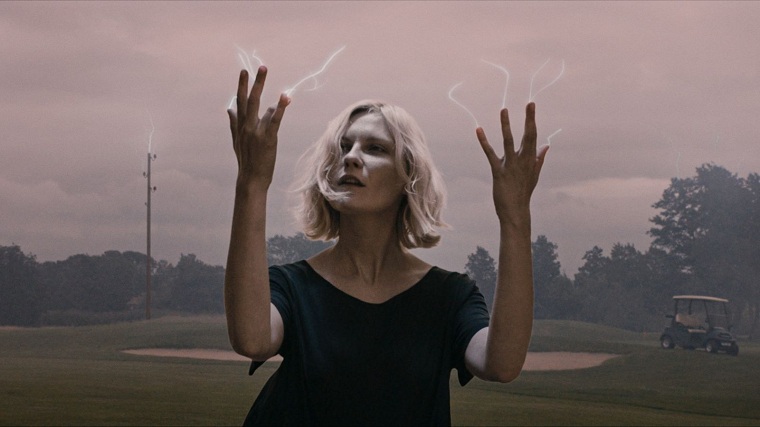
ERIC PFRIENDER
This is a weird year, for two reasons. First off, the list of things people love that I haven't seen is enormous (and contains most of the Best Picture front runners.) The Interrupters, Hugo, War Horse, The Artist, Into the Abyss, Martha Marcy May Marlene, Take Shelter, Margaret, A Separation, Certified Copy, The Descendants, The Skin I Live In, Tinker Tailor Soldier Spy, Bridesmaids, Extremely Loud and Incredibly Close*... the list goes on. I wish it were my job to see movies and write about them, but it's not. It's actually my job to go into a building and edit television during prime going-to-the-movies hours, which makes it incredibly difficult to see everything I want to see each year. The point being, even if I wanted to write a "Best of 2011" list, I couldn't because I am ill-informed. But I don't want to write a "Best of 2011" list. Like last year, I was hoping to present a few films that I thought were great, another few that I thought were pretty good, and then a few that I found to be way over-rated, all culled from the limited crop of films I was able to get my ass into the theater to see.
Which bring us to the second reason 2011 was a weird year: even the things I loved are, for the most part, deeply, deeply flawed. One of my favorite films from 2010 was the Coen Brothers' True Grit, which I described as "a near-perfect piece of filmed entertainment." You won't be seeing too much of that phrase this year. With one or two exceptions, the films I really liked this year were kind of a mess. In some cases that was part of what I loved about them, and in others I just ignored the crazy parts and focused on the things that I loved. In any case, without further ado I present the year of the flawed masterpiece...
THE CANON
THE TREE OF LIFE
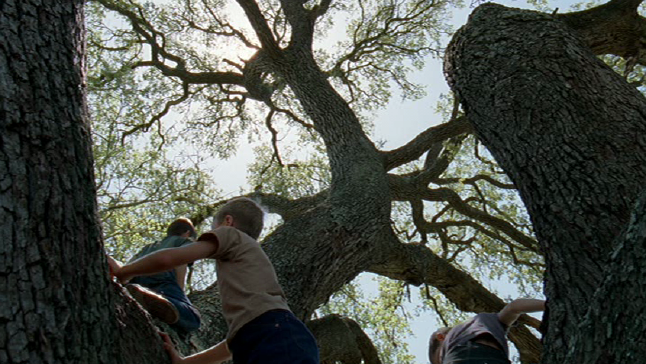
We did a roundtable/email thread discussion of this film a week or two after it was released, in which I said most of what I have to say about it. Summation: it is a glorious mess. I predict it will become something of a Rosetta Stone for Malick's oeuvre, in that the intense "spirituality" of his earlier work is from here on out seen as explicitly Christian because of Treeís Heaven sequence, where all the characters meet together on a beach in the afterlife, a sequence that nearly ruins the film for me. (I want to be clear here: I don't dislike the sequence because it is Christian, or even because it is religious; I hate it because it is fundamentally silly, and because it doesn't mesh with the style of the film's central section, which I think is one of cinema's great portraits of adolescence, and which basically takes a poetic-realist approach to depicting it.)
It's the Film of the Year in my book, although I'm a bit of a rabid Malick fan so I'm extremely biased. Nothing else was as polarizing in the film community, and certainly nothing in recent memory swung quite so hard for the fences, even if it whiffs a bit. I feel mostly the same way I did when we did the round table, which is that some of the elements work for me, others don't, but the section of the film that begins immediately after the "origins of the universe" sequence and ends when the family leaves Waco is phenomenal, and part of me wishes that was the whole film. It would be a whole lot less polarizing, and a whole lot more respected. As it stands, it's a beautiful mess.
I do want to mention one thing that's been driving me nuts all year: I get that Malick is an acquired taste, and if he's not your particular brand of whiskey that's fine. But I feel like I've been reading a lot of criticism that boils down to "Malick sure knows how to shoot a pretty picture, but..." I guess it's because Days of Heaven is renowned for having some of the best cinematography in film history or something, because of the rumors that the entire film was shot during magic hour (that's certainly how it was pitched to me before I saw it for the first time), but Malick seems to be boiled down to the "great cinematography" guy, as if that's the only thing his films are up to. Frankly, I find it incredulous that someone could watch one of his five films and not recognize that there is something else going on. In my mind, Malick is one of the few filmmakers working who has any semblance of control over how a shot or a sequence or a film is going to feel, not just how it's going to look (Michael Mann, Paul Thomas Anderson, classic-era Wong Kar Wai, and Roman Polanski are a few other names on the shortlist.) I'm not saying you have to like the work, but reducing what Malick is doing to "shooting pretty pictures" is going to make me question anything else you have to say about film, because it's pretty clear to me you have a pretty limited capacity to experience a piece of cinema and write about it. Which, again, is not to ignore the fact that Tree of Life is sort of a mess. Which it is.**
SHAME
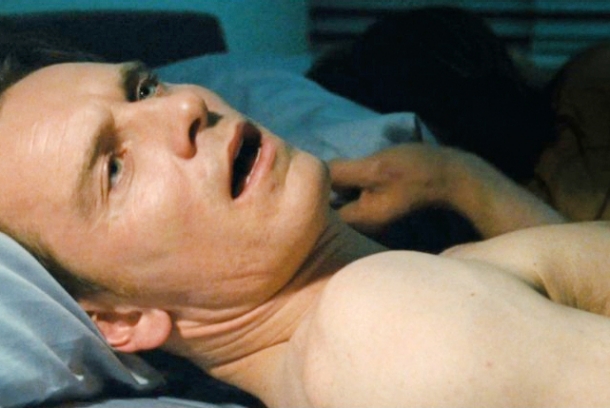
I've heard people complain that Shame uses an overabundance of style to mask the fact that it is fundamentally ridiculous. I just remember sitting in the theater, riveted by both style and content, thinking "they fucking nailed it." I suspect that a lot of viewers who want to laugh at the film are either not recognizing that Brandon's behavior is compulsive (he's an addict) or else can't get on board with the idea that sex addiction is a "real thing," or worse, they have no capacity for empathy with regards to any kind of addiction at all. I am not one of those people. The first 90 percent of the film is amazing. The extended opening sequence is phenomenal. Fassbender's performance is great - his face remains taut, just barely betraying the storm of anger, stress, rage and pain roiling beneath his carefully-maintained facade that he keeps to project to the world that he's got his shit together. Carey Mulligan's Sissy is instantly recognizable - I know that girl. For most of its running time, the script is great, taking chances while remaining on-point and elementally realistic. And the film is so fucking New York.***
It's not perfect. It completely collapses in the end - it felt like a first-year film student's psycho-drama for its last ten to fifteen minutes, complete with (spoiler-alert!) suicide attempts and characters collapsing to their knees in the drizzling rain under the sheer existential weight of it all, and I would have laughed out loud if I wasn't so disappointed. But for ninety minutes or so, this was my favorite film of the year.
DRIVE
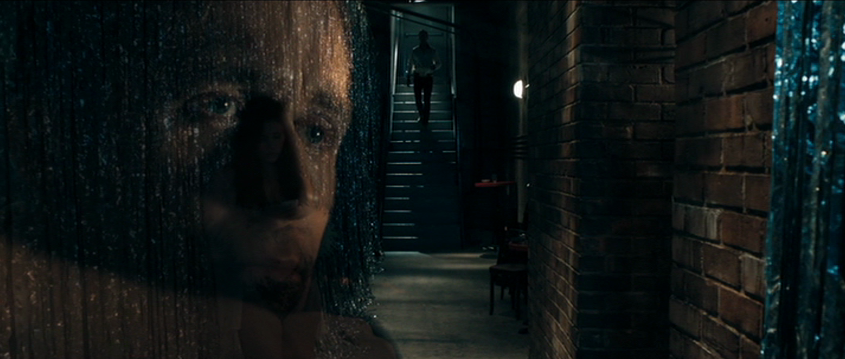
The illegitimate love child conceived during an acid-and-whiskey-fueled tryst in a dirty motel room between Michael Mann and John Hughes, carried to term by surrogate mother Molly Ringwald, and delivered by Jean-Pierre Melville in an unsanitized operating room somewhere in the basement of The Kingdom, Drive rolled through town, crushed a bunch of skulls, and picked up its fair share of haters along the way, not the least of whom was the Great Reprocessor himself, he of the penchant for podiatry, QT. On his patently fucktarted year-end list, Drive fell into the category labeled "Nice Try." To which I humbly respond, "Fuck You." Look, I like Reservoir Dogs as much as the next guy, and I hereby pay tribute and credit where credit's due and yada yada yada, but the fact is this: Quentin Tarantino wishes he could make a movie as good as Drive, because Drive threw a bunch of shit in a blender and what came out was a film about cinema, but when Quentin throws his stolen items into the cement mixer, at the end of the day we always seem to get the same statue, and it always looks suspiciously like a monument to the man himself. Drive is a crime movie about crime movies. Kill Bill is a movie about Quentin Tarantino.
Fuck the haters. Drive rules.
TABLOID
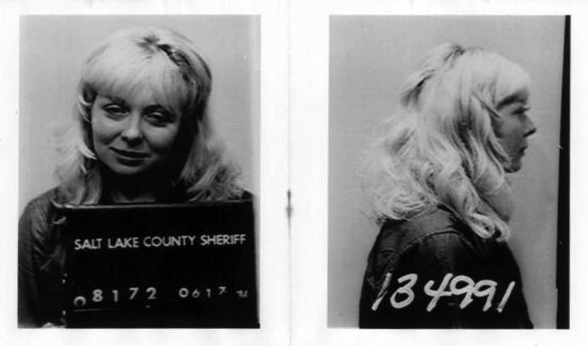
The funniest film of the year by a mile. I'd say it's my favorite Errol Morris film, but my favorite Errol Morris film tends to be whichever one I watched most recently. At the very least, it's his most pleasurable investigation into the nature of truth. Even its imperfections make it better: the ending feels so off-topic and weird that it's somehow perfect. At first, it felt like it was missing something crucial: the voice at the center of it all. What's a Rashomon-y investigation into a crime without the voice of the victim? But even that works towards the film's sensationalistic mess. It's a fast-paced, hilarious, visual treat, which is to say that its about as good as movies get. Most fun I had in a theater this year.
PRETTY GREAT
MONEYBALL
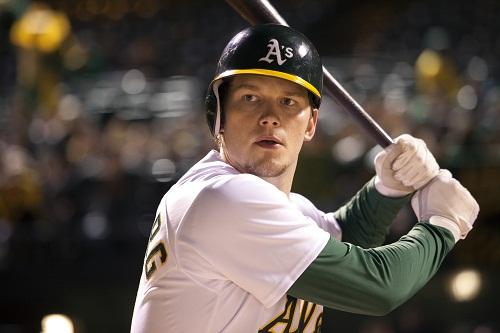
Every year, there seems to be one film that Hollywood gets right. Last year, I thought the Coen's True Grit was a perfect entertainment. This year, I'm going with Bennet Miller's Moneyball. Brad Pitt's movie star sheen is muted just enough for him to be believable as Billy Beane (although his best performance this year is still in Tree of Life), and if we're going to have to endure a period of "No, I can be serious, too!" films from Jonah Hill, this makes it seem like that won't be the worst thing in the world. Even the obnoxious parts of Aaron Sorkin's style seem to have disappeared into the script in service to the film as a whole. It's a joy to watch Beane and Brand's plan unfold, even though you probably already know the ending. A great, crowd-pleasing film.
THE RUM DIARY
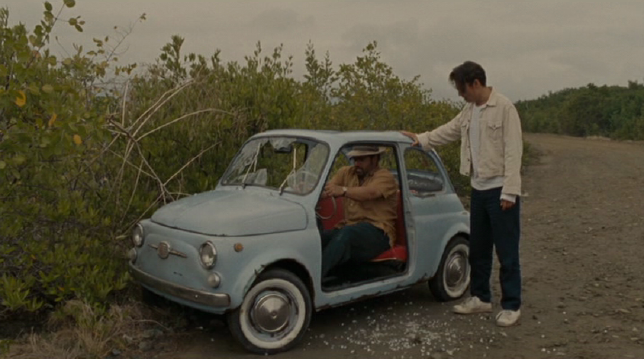
I read Hunter Thompson's book years ago, and it was basically the one thing that got it into my head that I wanted to visit Puerto Rico, although I suppose what I really wanted was to visit Puerto Rico in the late 50's. I proposed to my wife on a hotel balcony overlooking Old San Juan when we finally made it there, and the whole trip was basically the best week of my life, which is all a long way of saying that there was no way I wasn't going to see this, even if it seemed like it wasn't going to be anything more than a bit of Hunter S.-ploitation and a Johnny Depp vanity project. Which is why it was such a pleasant surprise to find that the great Bruce Robinson had crafted a really intelligent film about alcohol (Robinson, sober for years, fell off the wagon during production.)
This is a film that knows its hangovers. Sure, there are a few gonzo-style, zany nights out, but the movie spends just as much time on the ravaged mornings filled with headaches and regret as it does on the actual boozing. What emerges is a sentimental but more or less sober look at a rum-soaked journalist making a go of it in Puerto Rico at the end of the fifties. I left the theater much happier than I expected to be going in.
There's also some great location work in San Juan - I recognized at least a dozen locations/background buildings, so I loved it for my own sentimental reasons. The film misfires at the end a bit, trying to shoehorn in an "origin of Hunter S. Thompson, Super-Journalist" coda, in which "Duke" discovers the game is rigged and that bastards rule and he dedicates his life to ferreting out corruption through journalism or some such hagiographic nonsense, but keeping in tune with the rest of the films on this list, I was able to just ignore the things I didn't like and admire Robinson's film for what it does very, very well.
MELANCHOLIA
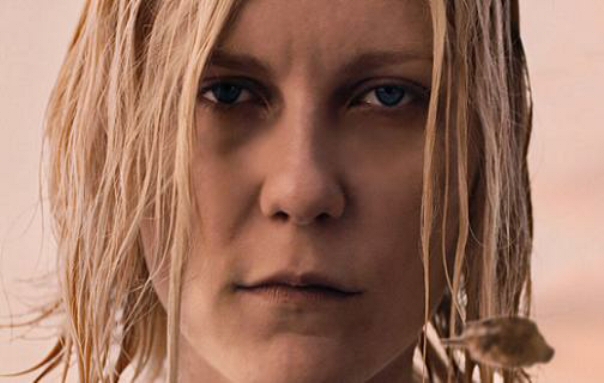
I always like Von Trier in theory, as a kind of principled stance aligned with exploration and provocation, but in practice his films don't always click with me. I really wanted to like Antichrist, but its just so...silly. It wants to be a brutal, extreme metaphor for grief and depression, but it's so over-the-top that it's simply ridiculous. Also, there's a talking fox (just like in a Disney film!)
When I heard that his next film was going to be about the end of the world, I got excited (if anybody loves a good apocalypse film, it's this guy), but I was very aware that it had every possibility of drifting over the edge into ridiculousness. I'm happy to report that it didn't.
Melancholia is a film about depression, and it gets nearly everything right. Of course it takes place amongst the ‹ber-rich, that's the point: having things that ought to fix the problem often makes the depression spiral worse (added benefit of central characters being one-percenters: that fucking location.) It nails the burden a depression-hole puts on your loved ones, it nails the narcissism, it nails the inability to think and lack of energy and lack of desire to preform even simple tasks like getting into the bathtub - first one foot, then the other. That the world is in fact ending and there was no point to anything after all is largely beside the point, because when you're that depressed you don't even have the will to say "I told you so." A sad, frustrating, honest and beautiful film.
Additional Thought #1: Melancholia is the first film where I finally caved and ordered it On-Demand straight to my TV while it was still in theaters instead of getting my ass to the Angelika. A few years ago I would have told you that was a heretical betrayal of the Church of Cinema, but honestly, as I mentioned earlier, I'm just so busy it was either this or not see it at all. And frankly, the experience was great. I'm sure the opening overture would have looked phenomenal on a big screen, but it's not like the Angelika has great screens anyway. I have a pretty good TV. Michelle and I were able to pause the film between its two main sections and make some Jiffy Pop. While I still prefer the theater, I now consider On-Demand a viable alternative.
Additional Thought #2: I wasn't going to say anything about all the bullshit controversy from Cannes, but it really made me mad, so indulge me: Shut the fuck up. Von Trier is not a Nazi, and he was obviously joking. The man has never done anything publicly that didn't have a wink to it, including all of his films which are games and pranks as much as they are works of art. The man is an entertainer and a provocateur, and the press conferences are just as much a part of the show as the films themselves. A lot of the voices professing outrage were the same voices hailing the brilliance of the new Louis CK special, which opens with a straight-faced "no Jews allowed" joke. And don't tell me it's a matter of venue/delivery, as if Cannes is somehow different than the Beacon Theater because it is in France, a haven for "seriousness" and "art." It's a fucking film festival with red carpets that shits its pants when Brad Pitt shows up. A joke is a joke. You don't have to think it's funny, but if you ask for a ride on an alligator, I don't want to hear your bitching when he chews your fucking leg off.
PINA & THE CAVE OF FORGOTTEN DREAMS
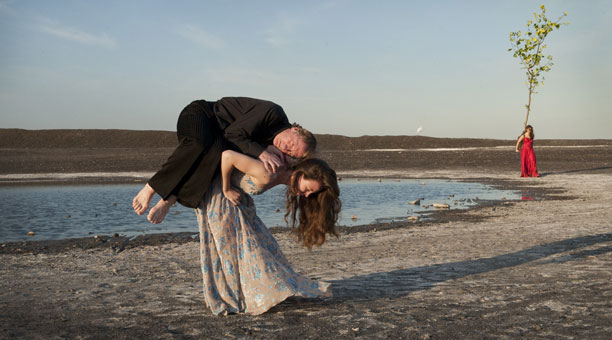
New German Cinema late-career 3D documentary-palooza! Both of these films could have easily been, and perhaps should have been, disasters. Yet I liked both of them a lot, albeit for weird, deeply personal reasons.
Of the two, Pina is the film that most deserves to be on a "Best of the Year" list. It's not easy to make a genuine work of art about an artist, but Wenders pulls it off here. The film is incredibly moving and informative without ever having to resort to a conventional talking head information delivery system, and functions equally whether you are a newcomer to Pina Bausch's work, or if you've been following her for years. The 3D is integral to the documentary itself, in that Wenders and Bausch had planned on doing a project like this for years, but never quite hit on the film language to properly film a staged performance. (As someone who has spent a good amount of time working with a theater company trying to find the right way to make a performance look interesting in a filmed image, I find this conundrum itself moving and empathize completely.) When they hit on 3D, they both felt like they had found the answer, but Pina passed away suddenly before they could begin filming. Luckily Tanztheater Wuppertal, Pina's company, insisted they pick up the project and what emerged turned out to be both a portrait of the artist and her work, and a personal tribute of love and respect from the people who knew her best. Its a beautiful film.
Two years ago, my wife took me to BAM to see Pina's Vollmond (Full Moon), the company's last piece developed before Pina died. It is one of the best things I've ever seen inside a theater, filmed or otherwise. It is one of my favorite works of art, and it's one of the new standards I hold things to. So getting to see Pina with my wife, sitting front row, dead center, with Wim Wenders speaking afterwards right in front of us, was a really special thing for me and made Pina my most cherished experience at the movies this year.
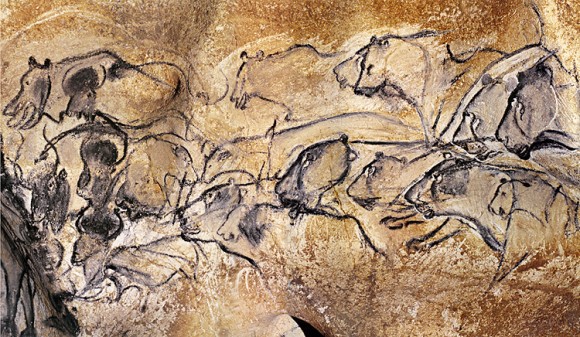
Cave of Forgotten Dreams is a whole other bag of worms. My relationship to Herzog is totally fucked up at this point. I get frustrated when I feel like this whole recent run of documentaries basically amount to self-parody, then I feel weirdly guilty about liking aspects of some of them. He was so instrumental during a period in my life in which I forged most of my beliefs with regards to film and filmmaking, but his reputation now has more to do with silly legends than it does the work itself, and what's worse, I've used those legends to entice students into discovering the work! The whole thing is a guilt-ridden neurosis-inducing disaster. So the first weirdly personal aspect of how I feel about this film is just that: I no longer have any idea what I think about Herzog. the Ecstatic Truth is real, right? I mean- the boat in the tree? Reigniting the oil fires "in a fit of madness?" The dancing chicken isn't a joke - that shit is moving, right? Right? "Jung-gull?" Hello?
So there's all of that bullshit piled on top of going to see any new Herzog. And then there's this: my dad called me at work one night last year, and he sounded upset in that way that dads get upset, and he told me his brother died. Heart attack. And there was a wake, and then a funeral, and then you try to get things back to normal, so I go to the movies. And I see this. And I'm thinking about my uncle, and how sudden it all was, and how in the middle of everything he must have been. He had a job, a woman he loved, he had been working really hard on repairing an estranged relationship with someone close to him and making progress, and then he was gone. And I'm thinking about this as I'm watching images from inside caves, the oldest known cave paintings, and I'm seeing the voices of people who lived on this earth thirty thousand years ago, and I don't know why they painted them, but they seemed to just be saying "we were here." And Herzog or no Herzog, 3D be damned, the entire thing was just incredibly moving, and I have no ability to view the thing with any kind of objectivity, and there you have it.
MIDNIGHT IN PARIS
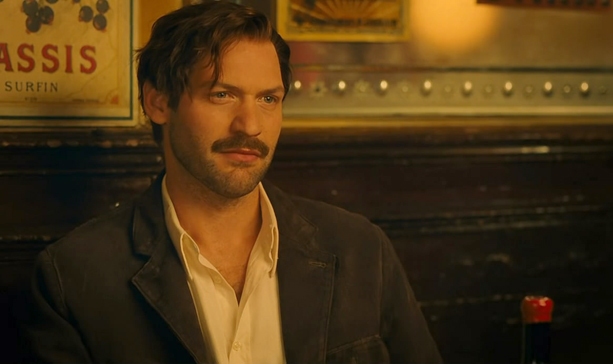
Woody Allen's box office smash (?!) came pretty damn close to teetering off the cliff into the "Inexplicably Overrated" category except...I liked it. It has all the hallmarks of Bad Woody (semi-miscast lead doing a mediocre-to-terrible Woody impression, a script that feels half-finished, and about a 1:2 ratio of jokes that hit to jokes that fall very flat.) It's even got that thing that Woody does where he makes casual highbrow references to philosophers and artists without really digging in, in an effort to make his characters seem erudite and sophisticated while simultaneously allowing the audience to congratulate themselves for vaguely remembering who Kierkegaard is, except here the problem is that the entire film is one of those references. It plays like it was written by a freshman Lit major who never went to class and just did a casual Wikipedia search on "Paris in the 20's" before cranking out a first draft, which then got shot as-is, revisionless. And still... every time Corey Stall's Hemingway said anything, I laughed out loud. No matter how much I over-intellectualize why this movie is terrible, I laughed as much as I did during anything except Tabloid this year, and I found the whole enterprise charming almost despite myself, and I need to just get the fuck off my high horse and admit that I liked it. So...I liked it.
INEXPLICABLY OVERRATED
BELLFLOWER
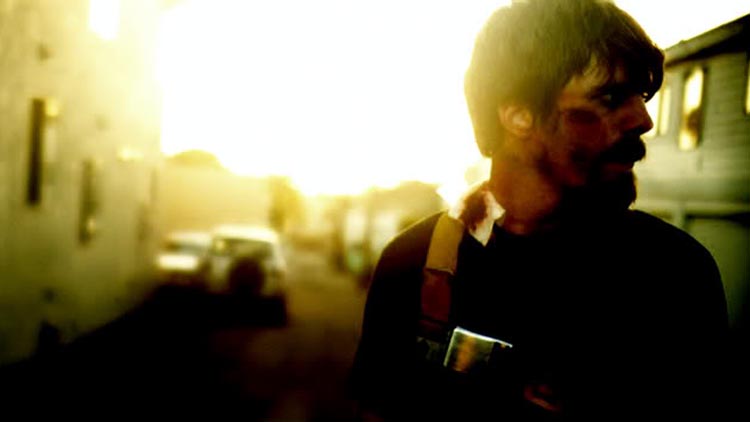
To be fair, I walked out of this so I didn't see the end of it, but fuck was it terrible. It's been a long time since I walked out of something in the theater, but this deserved it. Just a bunch of dudes whose development is even more arrested than the cast of an Apatow joint and the idiot women who love them, having terrible sex and being assholes. Also, part of the movie's "look how cool I am because I'm 'indie'" hype revolved around how the filmmakers built their own cameras or some such nonsense, which resulted in exactly what I feared it would: the movie looks like a muddy piece of shit. Utter garbage. Pretty sure it didn't get better after I left. The best part of the entire experience was the person I saw it with requesting our money back from the manager of the Angelika because "the film is terrible." Not "the print is scratched" or "somebody peed on the seat I sat in before I sat in it," but "the film you are showing at your theater is terrible." Getting a refund almost made the whole experience worthwhile.
MEEK'S CUTOFF
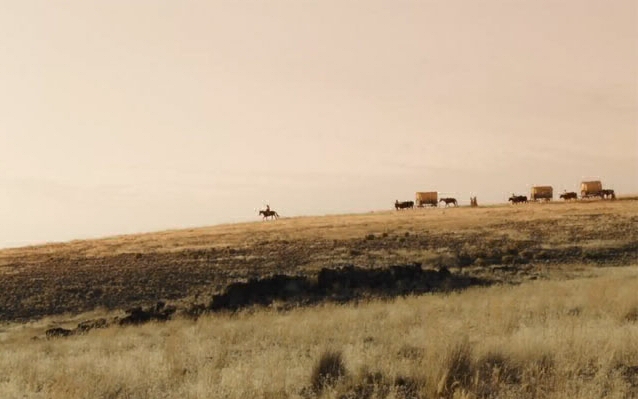
I didn't exactly walk out of this one, but I did pause it to make dinner and then I never finished it. But seriously, if you're going to make me watch a bunch of crackers travel the Oregon Trail in real time, your name better be Tarkovsky. I was trying to stick with Reichardt, but I think I'm done. I cut Old Joy slack because of the Yo La Tengo score and because I like things that look homemade, and I didn't hate Wendy and Lucy the way some other Pink Smoke contributors did, but this just played like...nothing. It wasn't even weighty enough to be pretentious. I won't argue with you about it like I will with Bellflower. If you tell me it's good, that's fine. But you're not going to convince me to turn it back on. Life is too short, and there are too many movies that might potentially have an interest in holding mine.
A DANGEROUS METHOD
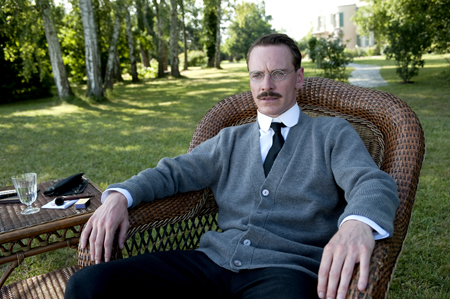
Continuing Cronenberg's late-period run of making films that disappoint me while making critics squeal with delight, A Dangerous Method left me wanting more. It wasn't quite the complete misfire that A History of Violence was, and I'm going to buffer my feelings by acknowledging that I saw it as the second half of an afternoon double-feature that started with Shame, so there was no way it was going to stand up to that kind of pressure. But seriously, there were scenes that felt like Cronenberg just plopped the camera down on sticks wherever it felt convenient and had the actors recite the words on the page. In a way, this film was more disappointing than History and Eastern Promises, because it had Fassbender and Knightley (she does the best she can with an impossible situation), two actors I am smitten with, and the premise was ripe for some Cronenbergian investigation, but nothing in the film even felt cinematic.
Basically, this film would have been better off as a medium-length New Yorker article.
HONORABLE MENTION: TV DIVISION
MILDRED PIERCE
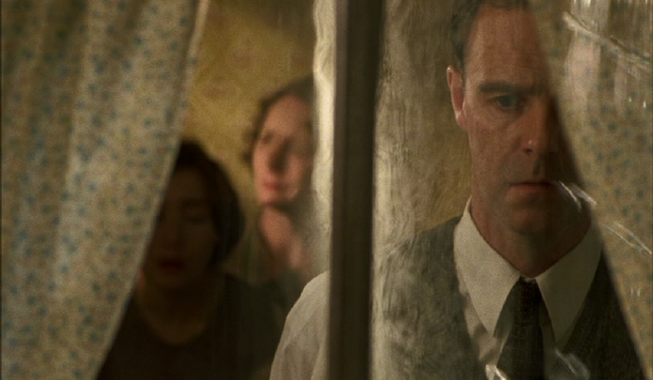
Todd Haynes, noted Fassbinder fan, made his very own Berlin Alexanderplatz this year. Well, sort of. It was a third as long, adapted from source material not quite as close to his own heart (Fassbinder supposedly claimed on more than one occasion, "I am Franz Bieberkopf!" - I have a hard time seeing Todd Haynes walking around campus proclaiming, "I Am Mildred Pierce!"), and it's not going to find the same cult artifact perch in cinema history, but still... Todd Haynes shot a pretty great period-piece mini-series for HBO this year!
The main benefit of the extra length afforded by a televised mini-series as opposed to a feature is mostly found in the depth of the performances. Kate Winslet gives probably my favorite Winslet performance (one that rivals the two great performances Julianne Moore gave for Haynes in Safe and Far From Heaven), Guy Pearce's charming, slimy turn as Monty earned all the praise it's received, and Brian F. O'Byrne is the unsung hero: his Bert, Mildred's weary husband, starts as a great character and only deepens and earns more of the audience's sympathy as the film unfolds - terrific work. Also: James Le Gros! But it's Veda, in a split performance between the young Morgan Turner and Evan Rachel Wood (last seen as a walking cliche in The Wrestler), who is the villain of the year. The combined performance is a worthy corollary to Gottfried John's Reinhold from Alexanderplatz, my personal favorite cinematic villain.
Ed Lachman is on point - if this wasn't Lubezkiís year with Tree of Life, it would be Lachman's. And the film itself is engrossing, the plot surprisingly propulsive given its running time. Brief warning: don't watch if you're trying to shed a few pounds: ten percent of Mildred Pierce is dedicated to beautiful depictions of the process of cooking delicious food, including pies, chicken and waffles. Seriously, it is obsessed with food. It's got more cooking scenes than Goodfellas.
* Really? How is there any way this film isn't terrible? Because it sure looks like it's just exploitative 9/11 grief porn. It's the second adaptation of a novel by Jonathan Safron Foer, whose books are primarily renowned for their surprising twists of language, not their plots. Which is to say, what makes them amazing is functionally unfilmmable. (I would like to thank Grant Goodman for the term "9/11 grief porn.")
** This isn't to say that Malick's films aren't beautiful. Emmanuel Lubezki's work here is leaps and bounds beyond anything else shot this year. Every shot in the film feels new, like something I haven't seen before. If he doesn't win the Oscar, it will be the biggest Academy fuck-up since...actually, fuck it. I may be done writing about the Academy. I get why it exists, but at this point it is so far removed from anything that I care about, as evidenced by what they are choosing to honor, and what I even have an interest in going to see. The point being, Lubezki rules.
*** There's a proud lineage of New York films - films shot on location where you just get a great look at what the city looks like and how it's evolving. 1976 had Taxi Driver, 1992 had Bad Lieutenant, and now 2011 has Shame. All of those shots where we see the skyscraper skyline through the windows, that great dolly shot through midtown while Brandon is jogging, all of the stuff on the subways, the trip to Brooklyn...yup: that's what NYC looks and feels like right now. Perfect.
Related Articles
home about contact us featured writings years in review film productions
All rights reserved The Pink Smoke © 2012